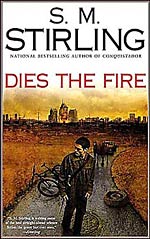
![]() Badseedgirl
Badseedgirl
6/7/2013
![]()
What would happen if a Fan Boy, who also happened to be an author, were to write a love note to a beloved fantasy author? I'm not sure, but I guessing it would look something like Dies The Fire by S.M. Stirling.
The story starts with all power being removed from the earth in a blinding flash of light, called "The Change". Not just electrical, but internal combustion engines, gunpowder, steam engines, and all other 20th, heck 19th century power. Society is immediately thrown back into the Middle Ages, well maybe not immediately but within a month. Who could survive such a global disaster? The answer turns out to be people who are devotees of J.R.R. Tolkien's "Middle Earth" Series, Renaissance fanatic and reenacts, and/or people who are Wiccan, and the Scott Irish.
Although I grew up on a steady diet of Tolkien as a child, thanks to my mom (who still has the entire middle earth set that I just used to find out what the baddie from LOTR's name was. I thought it was Saruman, but hey I should get some credit for knowing he was A LOTR baddie even if he wasn't The LOTR baddie), I am not a huge fan of Tolkien- type fantasy novel, preferring instead Urban Fantasy, but I do love a good (and not so good) Post-Apocalyptic novel. For me Dies The Fire fit this bill both ways.
It is clear the Mr. Stirling loves middle earth. The major baddie in the novel uses the unblinking eye of Sauron as his banner in his bid to become King of the North West, and one young character practically spend the entire novel in her own personal fantasy world of orcs and elves. But the wonderful part about the book is Mr. Stirling gives a nod and a wink to the absurdity of these characters without taking away for the skills this obsession brought to their lives. There are people like this, People who make swords and chain mail in their spare time and consider it a hobby. Anyone who has ever been to an international jousting tournament can attest to that, and yes there are such things. I myself have been working on developing my own "colonial arts" and am now able to grow my own food from heirloom seeds I collected, can and process the vegetables from my own garden, make my own bread from scratch using sourdough starter, make my own soap from oils, and crochet and knit my own clothes. I can also ride a horse, Does that make me a wack job, maybe, Would they be useful skills in a world where you would not be able to run down to the nearest big box store for supplies, undoubtedly.
Beyond that the characters in the novel are interesting, and the plotting of the story is quick. There is plenty of action and swords fighting. There are several plot points in the novel that seem too coincidental, but the author does not ignore this fact and has characters discuss how some characters seem supernaturally lucky.
I am not going to go into much discussion about the entire Wiccan aspects of the novel. I freely admit that I do not know enough about this religion to voice any sort of opinion about the validity of the Wiccan practices found in Mr. Stirling's novel. That is for someone who knows something about this religion. All I will say on the matter is that because I do not have a frame of reference to go from, the epilogue at the end of the book, where Lady Juniper blesses her child and all her coven are sighing and looking around in shocked wonder makes absolutely no sense to me. I felt like I should be concerned about what this foreshadows for the child and the community, but again without a frame of reference, I have no idea why.
All and all, this was a high spirited romp down Medieval Fantasy Land. I would give this novel a solid 4 stars, and am planning to read the next book in the series.
4 out of 5 stars